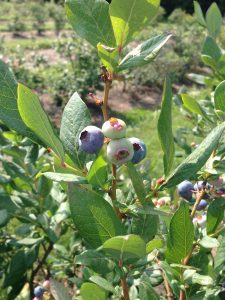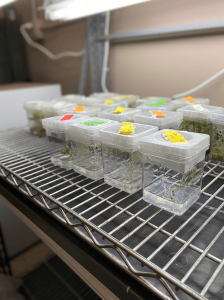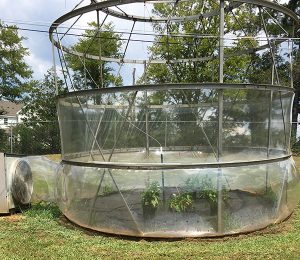Genomics-enabled molecular plant physiology
My lab primarily works on blueberries and potatoes, with expansion into crops relevant to our research questions. My research program facilitates the understanding of key components of the genomic, molecular, biochemical and physiological responses to abiotic stress in critical crop species, which can be funneled into strategies to develop climate resilient crops using computational and molecular tools (for review see Leisner, 2020).
Blueberry

We are elucidating the genes responsible for iridoid production in blueberry using comparative genomic approaches followed by molecular cloning for functional enzyme characterization. By combining metabolite and transcriptomic data for biosynthetic gene identification, I will develop a platform for determining the physiology and ecological function of iridoid biosynthesis in blueberry. We have also assembled an expanded diversity panel of blueberry cultivars to screen for secondary metabolites with human health benefits. By using blueberry as a model system we can not only study the evolution of plant secondary metabolism, but how abiotic stress imposed by future climate change can alter this perennial cropping system.
Potato

Using a systems biology approach, we are working to understand the impact of elevated temperature on tuberization and hormone signaling in potato. By integrating physiology data with next-generation sequencing data and molecular biology techniques we can work to identify the genetic mechanisms underlying fundamental changes in tuber developmental timing under future elevated temperatures and carbon dioxide (CO2) concentrations.
Pepper

In a collaboratively funded research project we are working to understand the effects of climate variability on host physiology and, in turn, host susceptibility towards pathogens. We are utilizing physiology, transcriptomics and metagenomics to understand the complex interaction of tropospheric ozone (O3) impacts on plant-pathogen interactions. This multifaceted research proposal is unique in its ability to focus on the physiological and genome-level changes in both the plant (pepper) and the pathogen (Xanthomonas) and attempt to understand how this complex interplay may be altered under an elevated [O3]. This project also previously leveraged an open-top field site at Auburn University.
Soybean
Using an integrative biology approach we are working to determine the effects of elevated [CO2] and on biomass nutrient accumulation in C3 plants. Using soybean as a model legume, we will empirically test seven hypothesized mechanisms associated with decreased nutrient content in seeds. We will then leverage modeling and field experiments to determine the physiological and molecular mechanisms associated with this phenomenon. This work is in collaboration with Auburn University, the Donald Danforth Plant Science Center and the University of Illinois Urbana-Champaign.
Lab Mission

The mission of this laboratory is to conduct research related to plants and their environment in a collaborative, transparent, inclusive and creative way. A priority of the Leisner lab is to foster diversity and inclusion among all members of the research group. The laboratory aims to be a welcoming environment for all people, including but not limited to race/ethnicity, socioeconomic status, gender identity, ability, age, religion, and sexual orientation. We see diversity as a resource, strength and benefit. We acknowledge institutional racism present within the scientific community and are committed to improving the representation of groups that have been historically underrepresented in the sciences. We do this through proactive development of historically-, socially-, cognitively-, and culturally informed practices implemented in our laboratory in order to create equitable research opportunities for everyone. The Leisner lab aims to create an atmosphere that is respectful, safe, creative, fun and open-minded.